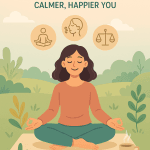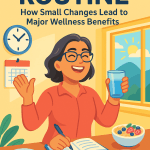Life isn’t always predictable, and stress has become a silent epidemic in today’s fast-paced world. Whether it’s work deadlines, family obligations, financial worries, or digital overload, we’re bombarded with triggers that tax our nervous system and rob us of joy. Yet, amidst the chaos, many are discovering something powerful: you can choose peace. You can live with more calm, clarity, and joy—no matter what life throws your way.
Contrary to popular belief, living stress-free doesn’t mean escaping all responsibilities or retreating to a remote island (though that does sound nice). It means developing the inner tools and external habits to respond to life with more resilience, grace, and intention.
Let’s explore science-backed and time-tested techniques that can transform how you handle stress, helping you live not only longer but happier and more fulfilled.
Understanding Stress: What’s Really Going On?
Before we tackle solutions, it’s vital to understand the root mechanics of stress.
Stress is a biological response to a perceived threat, real or imagined. When we face pressure, the brain activates the sympathetic nervous system, releasing hormones like cortisol and adrenaline. This “fight or flight” mode is useful for short-term survival, but when chronic, it wreaks havoc on your:
- Immune system
- Sleep quality
- Digestion
- Focus and memory
- Hormonal balance
- Emotional well-being
Long-term stress has even been linked to chronic diseases such as heart disease, diabetes, and anxiety disorders. The good news? With the right daily habits and mental shifts, you can reset your stress response and reclaim control over your inner world.
Start with Breath: The Fastest Way to Reset
Your breath is the remote control to your nervous system. Shallow, fast breathing tells your brain to stay on high alert. Deep, slow breathing signals safety and triggers relaxation.
Proven breathing techniques include:
- Box Breathing: Inhale for 4 seconds, hold for 4, exhale for 4, hold for 4.
- 4-7-8 Method: Inhale for 4, hold for 7, exhale slowly for 8.
- Diaphragmatic Breathing: Focus on expanding your belly, not your chest.
Just 2–5 minutes of conscious breathing can dramatically reduce cortisol levels and increase heart rate variability—a key marker of stress resilience.
Practice Mindfulness and Meditation
Mindfulness is the art of being fully present without judgment. It sounds simple, but in a world of distractions, it’s radical.
Studies show that regular meditation:
- Lowers blood pressure
- Improves emotional regulation
- Increases grey matter in the brain
- Reduces symptoms of anxiety and depression
You don’t need to sit cross-legged for hours. Start with just 5–10 minutes a day using apps like Headspace, Calm, or Insight Timer. Focus on your breath, body sensations, or simply the sounds around you. Mindfulness helps you respond to life, not react.
Simplify Your Environment
Cluttered space often leads to a cluttered mind. Studies have found a direct link between disorganization and higher stress levels.
Simple decluttering habits that reduce overwhelm:
- Keep surfaces clear
- Organize your digital space (yes, those 2,000 unread emails)
- Add calming elements like plants, candles, or natural light
- Embrace minimalist design to reduce sensory overload
Creating a peaceful environment helps your brain and body relax more easily. Your home becomes your sanctuary, not a source of stress.
Move Daily—But Mindfully
Exercise is one of the most effective natural stress relievers. It reduces cortisol, increases endorphins, and enhances mood.
You don’t have to run marathons. The key is consistency and joy:
- Brisk walking in nature
- Yoga or tai chi
- Dance or low-impact aerobics
- Strength training or swimming
Even 20–30 minutes of movement can shift your mental state and help process pent-up tension. Movement becomes not just physical release—but emotional renewal.
Nourish Your Body to Calm Your Mind
Your diet plays a critical role in stress management. Blood sugar spikes, caffeine overload, and processed foods all worsen anxiety and irritability.
Focus on:
- Complex carbohydrates (oats, quinoa, brown rice)
- Leafy greens and brightly colored veggies
- Omega-3 fatty acids (salmon, flaxseed, walnuts)
- Magnesium-rich foods (spinach, pumpkin seeds, avocado)
- Herbal teas like chamomile, ashwagandha, or lemon balm
Staying hydrated is equally important. Even mild dehydration can trigger fatigue and fogginess, leading to more stress.
Establish Boundaries and Learn to Say No
Much of modern stress comes from overcommitment and people-pleasing. Learning to set clear boundaries is a radical act of self-care.
Here’s how:
- Politely decline tasks that don’t align with your goals
- Limit toxic or draining relationships
- Create non-negotiable “me time” in your schedule
- Turn off work notifications after hours
Boundaries aren’t selfish—they’re essential for protecting your energy and maintaining emotional balance.
Create a Calming Evening Routine
Evenings set the stage for restful sleep, which is the foundation of stress recovery. Yet many of us scroll, snack, or work late into the night, keeping our minds on high alert.
Try this instead:
- Dim the lights one hour before bed
- Turn off screens or use blue-light filters
- Journal your thoughts or practice gratitude
- Enjoy light stretching or a warm bath
- Listen to soft music or white noise
These rituals tell your body it’s safe to unwind, preparing you for deep, restorative sleep.
Foster Joyful Connections
Humans are wired for connection. Isolation increases stress, while positive relationships reduce it. Studies show that people with strong social ties live longer and are more resilient under pressure.
Make time to:
- Call a friend
- Share a meal with loved ones
- Laugh—genuinely
- Join community or support groups
- Spend time with pets
Even brief, meaningful interactions boost oxytocin levels—a hormone that counters the effects of cortisol and fosters emotional safety.
Practice Gratitude and Reframe Your Perspective
Stress often comes from focusing on what’s wrong or what’s missing. Gratitude shifts the lens toward what’s already working.
Daily gratitude practices include:
- Writing down 3 things you’re grateful for
- Expressing thanks to someone in your life
- Reflecting on small wins or simple pleasures
Gratitude trains the brain to seek the good, even during challenging times. It also promotes hope, contentment, and optimism—essential ingredients for a calmer, happier life.
Conclusion: You Deserve a Calmer, Happier Life
Stress may be part of life, but suffering doesn’t have to be. With intentional choices and daily practices, you can build an inner environment where calm, joy, and resilience become your new normal.
Start small. Pick one or two of these habits and weave them into your day. Over time, these tiny shifts become powerful forces of change. You’ll begin to feel more grounded, think more clearly, sleep more soundly, and show up in the world with greater ease and presence.
You don’t need to escape your life to find peace. You can build it—moment by moment, breath by breath.
Because you deserve to live well. You deserve a stress-free, joyful life.
FAQs
While it’s impossible to avoid all stress, you can drastically reduce and manage it through intentional habits, making your life feel much calmer and more enjoyable.
Many people feel relief within days. Long-term benefits grow over weeks or months with consistent practice.
Absolutely. These are supportive habits that complement professional treatment and improve overall well-being.
Even small actions—like 5 minutes of breathwork or a short walk—can have a big impact. Self-care is scalable and flexible.
Yes. Practices like meditation, exercise, gratitude, and breathwork have been extensively researched for their stress-reducing benefits.
Definitely. Teaching stress-reduction techniques early builds lifelong emotional resilience and mental health awareness.








Post a comment